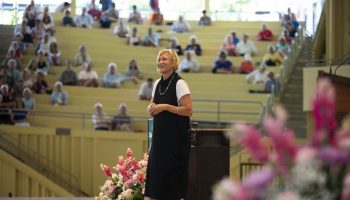GUEST COLUMN BY JILL VIALET
Google recently did a deep dive into its practices to identify key indicators for employee engagement and effectiveness. Google’s Project Aristotle found that successful teams shared two key characteristics. First, they found an equality in dialogue, meaning the distribution of “talk time” happened naturally instead of hierarchically. Second, team members had a higher-than-average ability to read one another’s emotions based on facial expressions.
For the past 22 years, I’ve led the national nonprofit Playworks, working with schools to build healthy school cultures through play. We do this through both direct services and training, and this year we will reach 1,800 schools and almost 1 million students through our efforts. Researchers have closely evaluated our impact and play’s extraordinary ability to bring out the best in kids. When I read about Google’s Project Aristotle, my first thought was that one of the easiest, if not perhaps the easiest, way to achieve these two characteristics is through play.
The same programming that we bring to kids — the same emphasis on play as a tool for promoting trust and rapport — is also an important part of how Playworks operates as a successful nonprofit organization. For example, we have a foursquare court in our office where staff can play when they need a brain break. Getting out from behind our screens to play together helps us practice greater empathy, better understand our peers, and sharpen our social and emotional skills; exactly what play does for children, too.
The research on play is clear: play is singularly effective in contributing to our abilities to make decisions, work collaboratively, self-regulate and practice self-awareness. This is not to say that all play is inherently constructive, or that empathy naturally springs forth when people are playing. Intention and norming by leadership are essential.
There are few safer ways to look at a power structure than through play and few easier ways to dig into a person’s character than through playing. As the founder and CEO at Playworks, I am aware that how I show up to play has an enormous impact beyond the more obvious minutes spent. People are watching to see how competitive I am and if I am a good sport when I lose. They are watching to see how I respond to other people leading, doing things differently than I might and making mistakes. Am I playing safely? Am I paying attention? Am I showing up on time and staying present?
Organizational culture is the sum of the values and behaviors that contribute to the unique psychological and social environment of an organization. Play is an often overlooked opportunity to cultivate organizational values in a low-stakes, non-verbal, easy-access way. Through play, we articulate expectations, experiences, philosophies and values. The way I, and the rest of our leaders, show up during play has an important norming effect on our culture. By extension, play affects our productivity and performance as an organization.
More recently, I’ve been thinking a lot about the role of play in society. Learning to be an engaged member of any community requires opportunities to build relationships, practice resolving disagreements and create solutions with others. These activities draw on social and emotional skills such as caring, empathy, trust and respect. These skills are not readily learned through traditional knowledge acquisition. They are honed in the relationships children — and grown-ups — build through collaboration and dialogue, whether it be in the classroom and the playground — or the office and the State House.
Playworks programming is based on research in children’s development that has long emphasized the importance of play for cognitive and social growth. American culture has largely isolated the value of play to either very young children or its physical benefits, as a relief valve for pent-up energy. These views miss the power of play for social-emotional development and the cultivation of the very skills necessary for democracy to function. These skills include cooperating, resolving conflicts, recognizing social norms and actively listening, among others. Playworks has demonstrated how children learn these skills on the playground and then use them in the classroom and beyond. At a moment when our nation is the most polarized it’s been since the Pew Research Center started measuring, there is much that we as adults can learn from lessons of childhood on the power of play in building an effective and healthy culture.
Jill Vialet is founder and CEO of Playworks, a nonprofit that brings play and physical activities to children across the country. In 2009, Playworks was selected as a member of the Clinton Global Initiative. Vialet’s honors include the James Irvine Leadership Award, the Pahara Aspen Education Fellowship, and Radcliffe’s Jane Rainie Opel Award.





